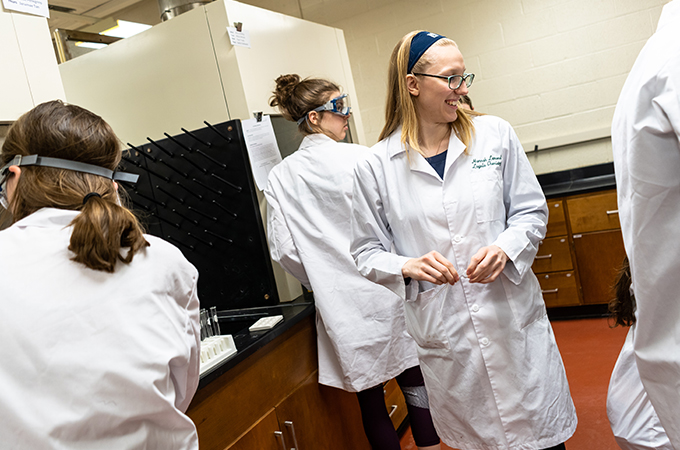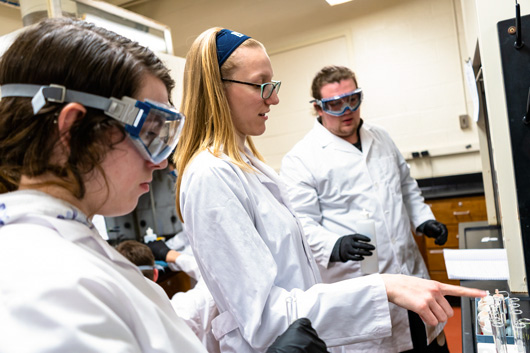Leading a lab
Gaining valuable experience as an undergraduate teaching assistant in Loyola’s chem labs
Hannah LaMond, Biochemistry Major/Writing Minor
Teaching Assistants (TA) are passionate individuals who work alongside the professor to ensure student progress and learning in a course. It is a position usually reserved for graduate students pursuing a Ph.D.
Loyola University Maryland doesn’t formally have Teaching Assistants. In fact, all classes here are taught by faculty. There is, however, a unique opportunity for undergraduate students to gain Teaching Assistant experience here—an experience I feel so fortunate to have taken advantage of.

As a current student, a space where I could be involved with students in a role like that of a TA seemed out of reach. The department of chemistry and biochemistry at Loyola has made innovative changes to the structure of its courses to implement a TA experience into its introductory chemistry laboratory courses.
What makes Loyola distinct is the implementation of this program: The department of chemistry and biochemistry is keying in on the benefits of having a TA, while simultaneously encouraging direct contact with the professors.
The introductory chemistry courses, along with every other undergraduate course at Loyola, are taught by the professor. TAs are employed to lengthen the reach of the professor, not serve as stand-ins for the professor.
Typically, there is one professor and one Teaching Assistant for each lab section of about 20 students. After collecting lab reports, TAs lead a workshop for students to practice and understand how concepts learned in lecture apply to experimentation. The professor will then present the pre-lab lecture, and the class heads to the laboratory to begin their experiments under the supervision of both the professor and TA.

This approach benefits the students in various ways. Students receive expert advice and instruction from the professor and gain additional insight from a TA, who has taken the same class. First-year students who might be nervous to approach the professor with their questions can build their confidence by asking the TA first. TAs also diversify the student lab experience by providing a different perspective; as a biochemistry major, I often relate what the students are learning in the chemistry laboratory to biological processes, and many other TAs connect to things beyond the classroom as well.
TA positions are open to upperclassmen who both perform well in their introductory chemistry courses and who receive a recommendation from a faculty member in the department of chemistry and biochemistry. Because of this open application, students from any background can apply, so long as they meet these requirements.
My own route to becoming a TA was a bit nontraditional. I spent last summer conducting research in the biology department as a Hauber Fellow. The Hauber Research Fellowship Program enables students to work alongside an expert faculty member for 10 weeks over the summer to conduct research of the student’s interest.
At the end of the summer, the Hauber Fellows give an oral presentation on their research. I was lucky enough to have Dr. Heather Schmidt, professor, lab manager, and TA Program Supervisor, in my audience. After my talk, Dr. Schmidt approached me and explained to me the influx of first-year students into chemistry courses meant the department would open another lab section. She asked me if I would be willing to TA for the lab section. Having missed the original application deadline, I eagerly accepted the opportunity.
I’ve gained a full year’s experience as an undergrad Teaching Assistant in the general chemistry laboratories. Since starting this role, I have grown both personally, intellectually as a scientist, and even professionally. I developed many leadership qualities while managing a laboratory: responsibility, constructive feedback, and effective instruction. One of the most important skills I’ve developed is accepting that I don’t know all the answers—and having the fortitude to creatively figure them out.
Being a TA has given me insight to some of the responsibilities as a graduate student and has deepened my interest in pursuing a graduate program. I can’t wait to see where this amazing opportunity will take me in my remaining time at Loyola—and beyond.